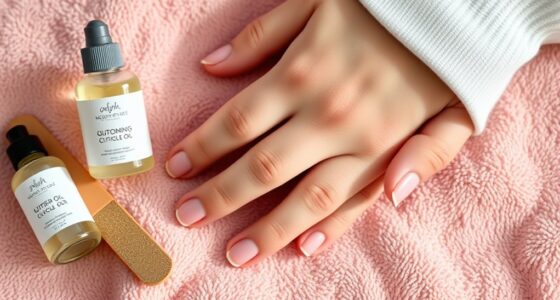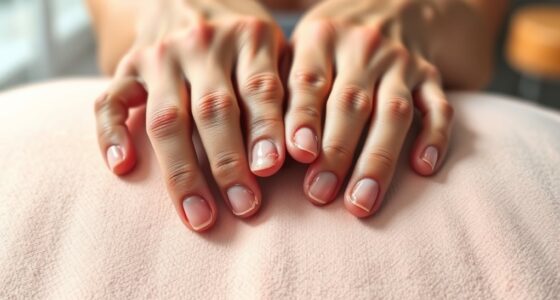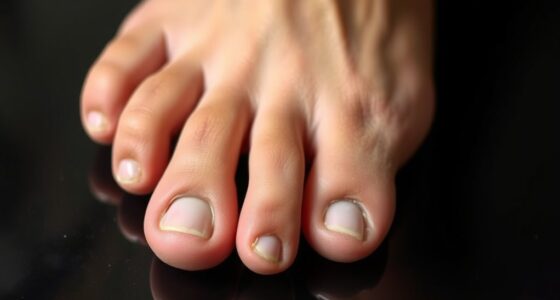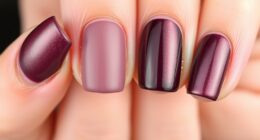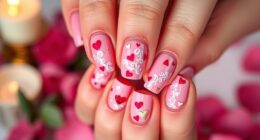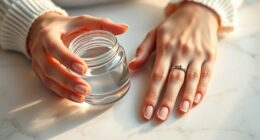To prevent and treat brittle nails, focus on gentle nail care, such as moisturizing regularly with nourishing oils and avoiding harsh chemicals. Maintain a healthy diet rich in biotin, zinc, and iron, and safeguard your nails from environmental stressors like water and UV rays. Consider supplements if needed, and address any underlying medical conditions. For persistent issues, consulting a professional ensures proper treatment. Keep these tips in mind to strengthen your nails over time.
Key Takeaways
- Maintain a balanced diet rich in biotin, zinc, iron, and vitamins A, C, E to support nail strength.
- Practice gentle nail care: avoid aggressive filing, push back cuticles softly, and moisturize regularly with nourishing oils.
- Protect nails from environmental damage by wearing gloves, using UV filters, and minimizing water and chemical exposure.
- Incorporate supplements like biotin, silica, and zinc to enhance keratin production and overall nail resilience.
- Seek professional advice for persistent or severe brittle nail issues to ensure proper diagnosis and treatment.
Understanding the Causes of Brittle Nails

Brittle nails often result from a combination of factors that weaken their structure. Your nail structure, composed of keratin, can become fragile due to internal and external influences. A genetic predisposition plays a significant role; if brittle nails run in your family, you’re more likely to experience them. Genetics can affect the thickness, flexibility, and overall strength of your nails, making them more prone to splitting and cracking. Additionally, inherited traits may influence how well your nails retain moisture, impacting their resilience. Understanding your genetics helps you recognize whether brittle nails are a natural part of your makeup or caused by other factors. For example, your nail health can be affected by various hereditary conditions that impact keratin production and nail durability. By identifying these underlying causes, you can better tailor your approach to maintaining healthier, stronger nails.
Adopting Gentle Nail Care Practices
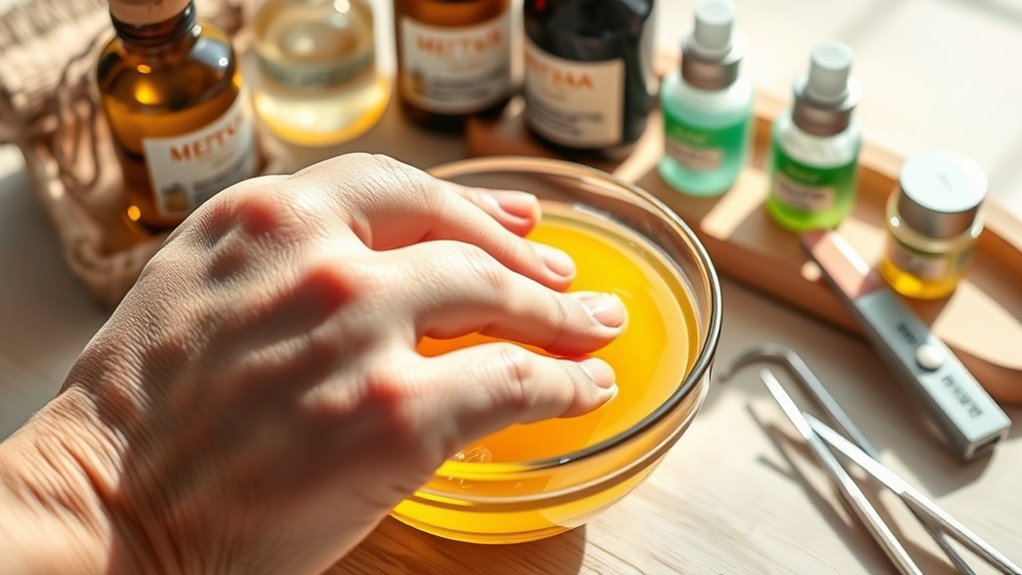
Since genetics can influence nail strength and moisture retention, adopting gentle nail care practices can make a significant difference. Be careful with nail trimming—use sharp, clean scissors or clippers and avoid cutting too close to the quick, which can cause damage. Instead of aggressive nail filing, opt for gentle shaping to prevent splitting. When pushing back cuticles, do so gently with a soft tool, avoiding harsh scraping or tearing, which weakens nails. Moisturize your nails and cuticles regularly with nourishing oils or creams to keep them hydrated. Avoid harsh chemicals and frequent exposure to water, which can dry out nails. Additionally, understanding your nails’ color accuracy can help you identify underlying health issues that may contribute to brittleness. Recognizing the importance of AI safety measures in health-related technology can support better diagnosis and treatment options. For optimal results, consider appropriate nail care products formulated specifically for strengthening brittle nails. Proper nutrition and hydration are also crucial for maintaining healthy nails. By handling your nails delicately and consistently, you reduce brittleness and promote healthier, stronger nails over time.
Maintaining a Nutritious Diet for Stronger Nails

Have you ever wondered how your diet affects the strength and health of your nails? Eating nutrient-rich foods provides the essential vitamins and minerals your nails need to grow strong and resilient. Incorporate a variety of foods like lean proteins, leafy greens, nuts, and whole grains into your meals. A balanced diet ensures you get biotin, iron, zinc, and vitamins A, C, and E, which are crucial for nail health. Avoid deficiencies that can lead to brittle, flaky nails. Consistently nourishing your body with these foods supports collagen production and improves nail elasticity. Including nutrient-dense foods in your diet can also help enhance overall nail strength and appearance. Additionally, incorporating UV filters in your nail care routine can also help protect against environmental damage that contributes to brittleness. Taking steps to minimize environmental damage can further preserve your nails’ strength. Being mindful of pet hair management practices can reduce the risk of hair and dander transfer to your nails and skin, promoting overall nail health. Remember, what you eat directly influences your nails’ strength and appearance, so prioritize a nutrient-dense diet to maintain healthy, beautiful nails over time.
Protecting Nails From Environmental Damage
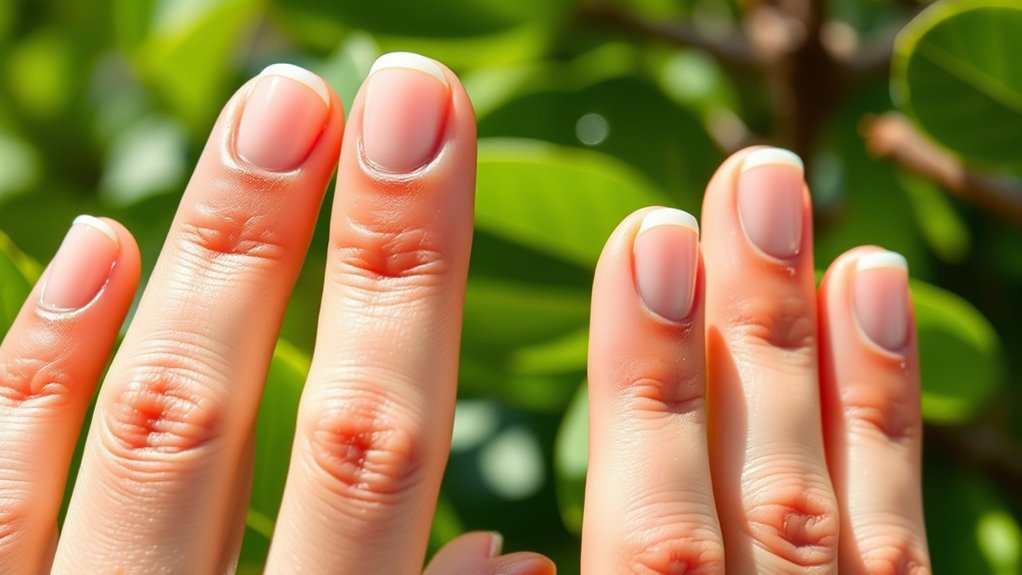
Environmental factors like harsh weather, chemicals, and excessive moisture can quickly weaken your nails if you don’t take precautions. To protect them, prioritize UV protection by wearing gloves or applying a UV-blocking top coat when outdoors. Weather shielding is essential during extreme conditions—cover your nails in cold, windy weather, and avoid prolonged exposure to water or harsh cleaning agents. Always wear gloves when doing household chores or gardening to minimize contact with damaging substances. Keep nails dry and avoid sudden temperature changes to prevent cracking and splitting. Using a base coat with protective ingredients can serve as a barrier against environmental damage. Incorporating professional equipment ensures your nails are cared for with the highest quality tools and products. Additionally, using nail strengthening treatments can further enhance nail resilience and prevent brittleness caused by external elements. Staying informed about data privacy challenges helps you understand the importance of protecting your personal information, just as protecting your nails requires awareness of environmental risks. By taking these steps, you’ll help preserve your nails’ strength and prevent brittleness caused by external elements.
Using Moisturizers and Cuticle Oils Effectively

To get the best results, you need to apply moisturizers and cuticle oils correctly. Choose products suited for your nails and use them consistently for ideal hydration. By following proper techniques and a regular schedule, you’ll see healthier, stronger nails over time.
Proper Application Techniques
Applying moisturizers and cuticle oils correctly can make a significant difference in improving brittle nails. To maximize their effectiveness, start by gently pushing back cuticles after soaking your nails, avoiding aggressive cuticle pushing that can damage the nail bed. Before applying oils, ensure your nails are clean, free of nail polish removal residue, which can dry them out further. Use your fingertip or a brush to evenly distribute the product, focusing on the nail bed and cuticle area. Regular, targeted application helps lock in moisture and promotes healthier growth. In addition, consistent use of moisturizers can help mitigate the effects of dryness and damage associated with brittle nails. Here’s a quick guide:
| Step | Action | Tips |
|---|---|---|
| Clean nails | Remove old polish & residue | Use gentle nail polish remover |
| Dry thoroughly | Prepare for application | Avoid moisture before oils |
| Apply moisturizer | Focus on cuticles & nails | Use enough but not excess |
| Massage gently | Increase absorption | Stimulates blood flow |
| Repeat regularly | Maintain consistent routine | Daily or nightly for best results |
Choosing the Right Products
Choosing the right products is essential for effectively nourishing brittle nails. Look for moisturizers and cuticle oils that contain nourishing ingredients like vitamin E, jojoba, or almond oil. When selecting nail polish brands, opt for formulas free from harsh chemicals like formaldehyde or toluene, which can weaken nails further. Some nail polish brands now offer strengthening or moisturizing options that support nail health. If you enjoy nail art techniques, choose products that won’t damage or peel easily, and always seal your nails with a nourishing topcoat. Using the right products in combination with proper application guarantees your nails receive the hydration they need while avoiding further damage. Incorporating natural materials and maintaining a rustic-inspired routine can also promote stronger nails over time. Additionally, avoiding excessive use of nail polish remover containing acetone helps prevent further dehydration. Being mindful of chemical exposure from various nail products can significantly contribute to healthier nails. Practicing good nail care habits and ensuring consistent hydration are key to strengthening brittle nails. This strategic approach helps you maintain healthier, more resilient nails over time.
Frequency of Use
For best results, you should use moisturizers and cuticle oils consistently rather than sporadically. Regular application keeps your nails hydrated and strengthens the nail bed, especially after nail polish removal, which can dry out your nails. If you wear acrylic nails, it’s essential to moisturize often, as acrylic use can weaken your natural nails and cause brittleness. Applying cuticle oils daily helps maintain flexibility and prevents cracking. Don’t forget to reapply after activities that strip moisture, like frequent nail polish removal or exposure to harsh chemicals. Consistent use of these products is crucial for effective nail health. Skipping days can undo progress and diminish the benefits of your routine. By making moisturizers and cuticle oils a daily habit, you’ll nourish your nails from the inside out and reduce the risk of brittleness over time. Incorporating proper hydration techniques can further enhance nail health and prevent dryness. Additionally, maintaining overall nail health can be supported by regular cleaning and gentle handling, which minimizes damage and brittleness. Engaging in mindful practices, such as stress reduction techniques, can also contribute to healthier nails by reducing physical and emotional stress that may impact nail strength.
Avoiding Harsh Chemicals and Nail Products
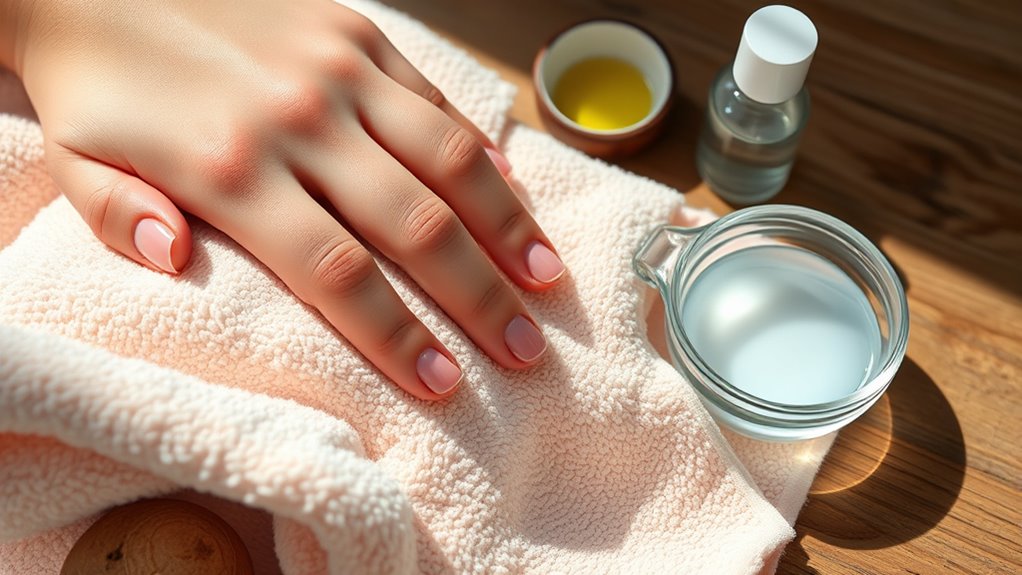
To protect your nails, choose gentle formulas that won’t cause damage. Always read ingredient labels to spot harsh chemicals like formaldehyde or toluene, and avoid products with them. Limiting your exposure time to strong chemicals helps keep your nails healthy and less brittle.
Choose Gentle Formulas
Opting for gentle nail products can make a significant difference in preventing further damage to brittle nails. When choosing nail polish removers, opt for acetone-free formulas that are less harsh and drying. This helps keep your nails and cuticles healthy. Be cautious with nail polish removal; avoid excessive scrubbing or harsh solvents that strip moisture. Additionally, practice gentle cuticle trimming techniques, avoiding aggressive cutters or peeling methods that can weaken nails. Look for nourishing formulas that contain soothing ingredients like aloe or vitamin E. By selecting products free from harsh chemicals and using gentle techniques, you reduce the risk of further brittleness and promote healthier nail growth. Consistent use of gentle formulas supports your nails’ natural strength and resilience over time.
Read Ingredient Labels
Reading ingredient labels carefully is essential because many nail products contain harsh chemicals that can worsen brittle nails. By checking ingredient labels, you guarantee product safety and avoid harmful ingredients. Here are four tips to help:
- Look for formaldehyde, toluene, and dibutyl phthalate—these are common toxins linked to nail damage.
- Choose formulas labeled “free” (e.g., 3-free, 5-free) to reduce exposure to harmful chemicals.
- Avoid products with acetone, which can dry out nails further.
- Prioritize brands that prioritize safe, natural ingredients for healthier nails.
Being diligent about reading ingredient labels helps you select safer nail products, reducing the risk of damage and supporting stronger, more resilient nails.
Limit Exposure Time
Limiting the amount of time your nails are exposed to harsh chemicals and nail products can considerably reduce damage. Prolonged sun exposure and artificial UV rays can weaken nails, making them more brittle. Always wear gloves when handling cleaning agents or using harsh nail polishes, and try to minimize the time your nails spend in direct sunlight. If you use UV-based nail curing lamps, limit your sessions to prevent excessive nail dryness and breakage. Protecting your nails from these environmental factors helps maintain their strength and flexibility. By controlling exposure duration, you reduce the risk of further damage, allowing your nails to recover and stay healthier longer. Remember, less exposure means healthier, stronger nails in the long run.
Incorporating Supplements to Support Nail Health

Supplements can play a vital role in strengthening brittle nails, especially when your diet lacks essential nutrients. Incorporating targeted supplements can boost nail health effectively. Here are four key options:
Targeted supplements like biotin, silica, vitamin E, and zinc can help strengthen brittle nails effectively.
- Biotin supplements: Known for promoting keratin production, biotin strengthens nails and reduces brittleness.
- Silica intake: Enhances collagen formation, making nails more resilient and less prone to breakage.
- Vitamin E: Supports nail growth and improves flexibility.
- Zinc: Aids in repairing damaged tissues, promoting healthier nails.
Consistently adding these nutrients can improve nail strength over time. Remember, supplements work best alongside a balanced diet. Always consult with a healthcare professional before starting new supplements to guarantee they’re right for you.
Addressing Underlying Medical Conditions

Underlying medical conditions can considerably contribute to brittle nails, making it essential to identify and address these issues to improve nail health. You should consider medical testing to uncover conditions like hypothyroidism, psoriasis, or fungal infections that weaken nails. Nutritional assessments are equally important, as deficiencies in iron, biotin, zinc, or other nutrients can cause brittleness. Consulting with a healthcare professional allows you to get accurate diagnoses and tailored treatment plans. Addressing these underlying issues helps restore nail strength and prevents future problems. Remember, treating the root cause is often more effective than relying solely on topical remedies. By combining medical testing with nutritional assessments, you can develop a *holistic* approach to improving your nail health from the inside out.
When to Seek Professional Nail Care Assistance
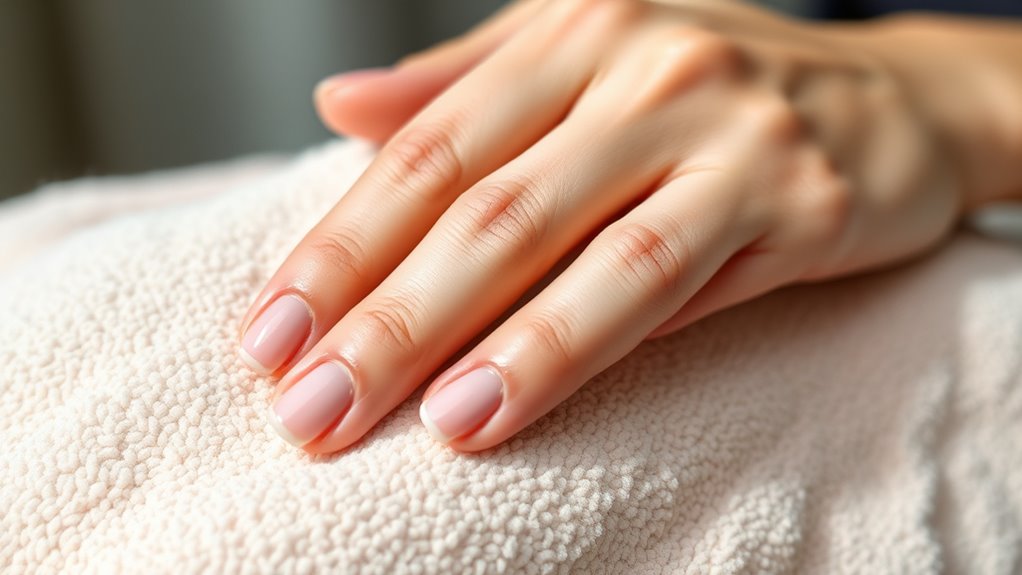
Knowing when to seek professional nail care assistance is essential for maintaining healthy nails, especially if you notice persistent problems or sudden changes. If your nails become severely brittle, discolored, or start splitting despite proper care, it’s time to consult a professional. This is especially important if you’re interested in nail art or acrylic enhancements, which can cause additional stress or damage if not done correctly. Consider professional help if:
- You experience pain or swelling around your nails.
- Your nails refuse to grow or show signs of infection.
- You notice persistent peeling, cracking, or unusual discoloration.
- You’ve had repeated issues with nail enhancements or artificial nails that worsen your condition.
Professional nail technicians can assess underlying causes and recommend safe treatments or alternatives.
Frequently Asked Questions
Can Brittle Nails Be a Sign of More Serious Health Issues?
Brittle nails can sometimes signal more serious health issues. You might have nutritional deficiencies, like lacking biotin or iron, which weaken nails. Hormonal imbalances, such as thyroid problems, can also cause brittleness. If your nails become extremely fragile or change color or shape, it’s important to see a healthcare professional. Addressing underlying issues like deficiencies or hormonal imbalance can improve your nail health and overall well-being.
Are There Specific Home Remedies Proven Effective for Brittle Nails?
Think of your nails as tiny soldiers needing armor. Home remedies and natural treatments can help strengthen them. Try soaking your nails in olive oil or coconut oil to boost moisture. Using biotin supplements or applying vitamin E oil also promotes growth. These simple home remedies aren’t instant cures but can gradually reinforce your nails, making them less brittle. Consistency with these natural treatments is key to seeing healthier, stronger nails over time.
How Long Does It Typically Take to See Improvements in Nail Strength?
When asking how long it takes to see improvements in nail strength, you’re looking at the nail growth timeline and improvement timeframe. Typically, you might notice stronger nails within 4 to 6 weeks, but full results can take up to 3 months. Consistent care, like moisturizing and avoiding harsh chemicals, helps speed up this process. Patience is key, as nails grow gradually and need time to reflect your efforts.
Can Aging Alone Cause Nails to Become More Brittle?
Aging effects can definitely make your nails more brittle over time. As you age, your nail resilience decreases because of slower cell turnover and reduced moisture. You might notice your nails become thinner, weaker, or more prone to breakage. While aging alone can cause these changes, other factors like nutrition and health also play a role. Maintaining good hydration and a balanced diet can help support your nail health despite aging.
Are There Recommended Nail Care Products for Sensitive Skin?
You might wonder if certain nail care products suit sensitive skin. Investigating this, you’ll find hypoallergenic formulas and fragrance-free options are your best bets. These products reduce irritation and are gentle on your skin. Always check labels for these features, and consider doing a patch test first. Using gentle, dermatologist-recommended brands helps protect your nails and skin, ensuring you enjoy healthy, beautiful nails without discomfort.
Conclusion
By caring for your nails like delicate glass, you can prevent cracks and brittleness. Imagine your nails as tiny shields, strong and resilient, glowing with health from gentle care, nourishing foods, and protection from harsh chemicals. When you nurture them daily, they’ll stand firm against life’s challenges, shining with strength and vigor. Take control, and let your nails tell a story of health and resilience that catches everyone’s eye.


